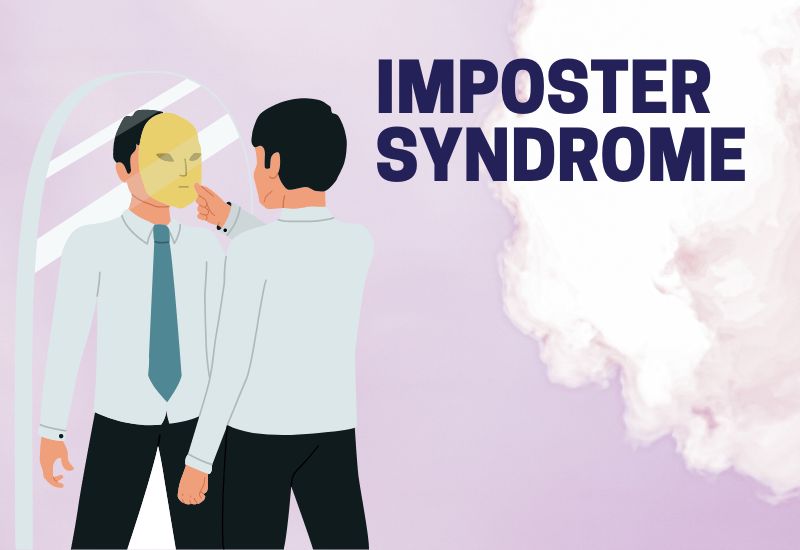So you’ve got a new job, or maybe you’re embarking on a whole new career. Maybe it’s something you’ve dreamed of doing your whole life. Or maybe it feels like the last thing you’d ever be good at. Impostor syndrome is that nagging sensation that we aren’t good enough, don’t know enough, or can’t measure up to other people. It creeps up on even the most confident people from time to time. In fact, some research estimates that 70% of people will experience imposter syndrome at some point in their lives.
What is Imposter Syndrome?
Imposter Syndrome is a psychological phenomenon in which individuals feel a sense of inadequacy, even after achieving success. It is characterized by feelings of self-doubt, fear of failure, and fear of being exposed as a fraud. This sense of inadequacy can come from many different sources, including personal insecurities, comparison to others, and cultural or societal pressure. Despite their success and accomplishments, those with imposter syndrome often have difficulty believing in their own abilities and strengths. They feel like they are fooling everyone and fear that they will one day be found out. Imposter syndrome can have serious consequences, including low self-esteem, anxiety, and depression.
5 Types of Imposter Syndrome
Imposter syndrome has recently been researched more extensively, and it has been determined that there are five varieties of individuals who suffer from it. These include perfectionists, superheroes, experts, geniuses, and soloists (Young, 2011). Each category has the same fundamental symptoms and signs, but they behave in different ways due to the manner in which self-competence is evaluated. We’ll examine these categories in more detail below.
Perfectionists
These individuals have an all-or-nothing approach, and if something isn’t 100% perfect, they consider themselves a failure. They spend little time reflecting on how well they are already doing when they want to improve things. Small or minor mistakes threaten their sense of competence.
Perfectionists often work overtime, avoid rest, and engage in destructive self-talk in order to motivate themselves to reach their goals. Even if this helps them achieve their objectives, they still downplay their achievements and exacerbate their mistakes. They also ignore favorable responses from other people, which may perpetuate the notion that they can always be better.
Superheroes
Some individuals with imposter syndrome have a superhero complex, in which they assess their ability based on how many different things they can handle simultaneously. A superhero is someone who plays many roles and desires to achieve success in each one (e.g., parent, mentor, friend, colleague, etc.).
They seek approval or validation from others, and they strive to work harder than anyone else. It’s hard for them to unwind and do nothing since they view this as a lost opportunity.
Experts
People with imposter syndrome have the tendency to become experts, where they measure their proficiency in accordance with their intelligence or knowledge. Even after investing a lot of time and effort into studying, they continue to believe that they don’t know very much. Expertise is identified by gathering as much data as possible about a subject before acting.
Geniuses
Individuals with imposter syndrome may believe they should be innate geniuses or prodigies, gauging their ability based on how effortlessly they can finish tasks or achieve success. For example, getting an A without trying or studying and being perceived as naturally intelligent
They believe that brilliance should come naturally and that hard work is not required for success. As a result, they usually avoid difficult or daunting tasks in order to avoid finding out immediately that they are not good at them.
Soloists
Those who suffer from imposter syndrome typically believe that they should be able to accomplish things on their own. Soloists prefer to work alone and avoid collaborative or group working settings. They usually view requesting assistance as a sign of weakness or failure.
6 Tips to Overcome Imposter Syndrome
1. Change Your Mindset
Impostor syndrome is rooted in fear and self-doubt. In order to overcome it, you have to change your mindset. Accept that everyone experiences imposter syndrome, even the most successful people in the world. There’s no shame in feeling like you’re not good enough sometimes. The key is to not let these feelings stop you from moving forward. Impostor syndrome is the voice inside your head that tells you not to try. When you’re not feeling confident, it tries to convince you that you don’t have what it takes to succeed. When you’re experiencing imposter syndrome, switch gears and focus on the benefits you can get from whatever you’re trying to do. Remind yourself of why you do what you do, and that you’re doing it for a reason. When the imposter syndrome is particularly strong, you may need to be more assertive with yourself.
2. Practice, Practice, Practice
Practice is the tried-and-true advice that anyone in any field will give you. It’s the thing that makes you good at what you do. If you’re feeling like you’re not good enough, it’s likely because you’ve never had to do the thing you’re trying to do before. Impostor syndrome can creep up when you’re starting a new job or maybe getting into a whole new field. When faced with something totally new, it can definitely be scary. The best way to get over imposter syndrome is to do the thing. In order to become proficient at something new, you have to practice. Even if it feels like you’re terrible at first, keep practicing until you’re not terrible anymore.
3. Don’t Rely On Your Memory
When you’re feeling like an impostor, you’re likely to remember the bad times—the times you felt terrible. You’re not likely to remember the times you felt confident. As much as you want to, you can’t ignore the bad times. You have to face them head-on, learn from them, and let them go. You can’t let those bad experiences define you or stop you from trying new things. When you’re feeling like an impostor, you’re likely to rely on your memory, selectively remembering the negative. Even if imposter syndrome is something you’ve always dealt with, you can’t let it define who you are. You have to let those bad experiences go. Find ways to remind yourself of the times you’ve felt confident—the positive memories.
4. Set Small Goals For Yourself
If you’re feeling like an impostor, you might be worried that you’re not good enough to achieve your goals. If you’re in a new job, or starting a new career, you might be worried that your goals aren’t realistic enough. If you’re worried about achieving your goals, imposter syndrome might be creeping in. When you’re worried about your ability to achieve your goals, set small, achievable, milestones for yourself. Setting small goals gives you the chance to prove to yourself that you do have what it takes to achieve your goals. When you get to the end of each small goal, you’ll have the momentum to keep going, and the confidence that you can do it.
5. Ask For Help When You Need It
When you’re feeling like an impostor, it’s easy to think that you have to do everything on your own. Impostor syndrome will try to convince you that you can’t ask for help, that you have to do everything on your own. But the truth is that you don’t have to do everything on your own. You don’t have to do everything perfectly. If you’re in a new job, or starting a new career, you might not know everything you should know. That’s okay. You don’t have to know everything right away. You just have to be willing to ask for help when you need it. When you ask for help, you let other people help you. You give other people the chance to feel good about themselves, and you give yourself the chance to succeed.
6. Celebrate The Wins
Negative experiences have a way of sticking with us much more than the positive ones. The more you can celebrate the successes you’ve had, the more you can combat impostor syndrome. Keep track of the small wins, even the ones you’re not sure are “wins”. When you’re in a new job, or starting a new career, it can be easy to focus on the things you don’t know. Impostor syndrome will make you want to focus on the things you’re bad at, the things you don’t know. But you can’t let imposter syndrome get the best of you. When you focus on the things that you’re good at, you can turn those little victories into confidence-building experiences.
A Word From BeyondPsychub
When impostor syndrome creeps up, it can be easy to fall into a negative spiral of self-doubt. The best way to break out of that spiral is to change your mindset, practice, set small goals for yourself, ask for help when you need it, and celebrate the wins. The more you can do to combat impostor syndrome, the more you can make of what you’re good at.
















